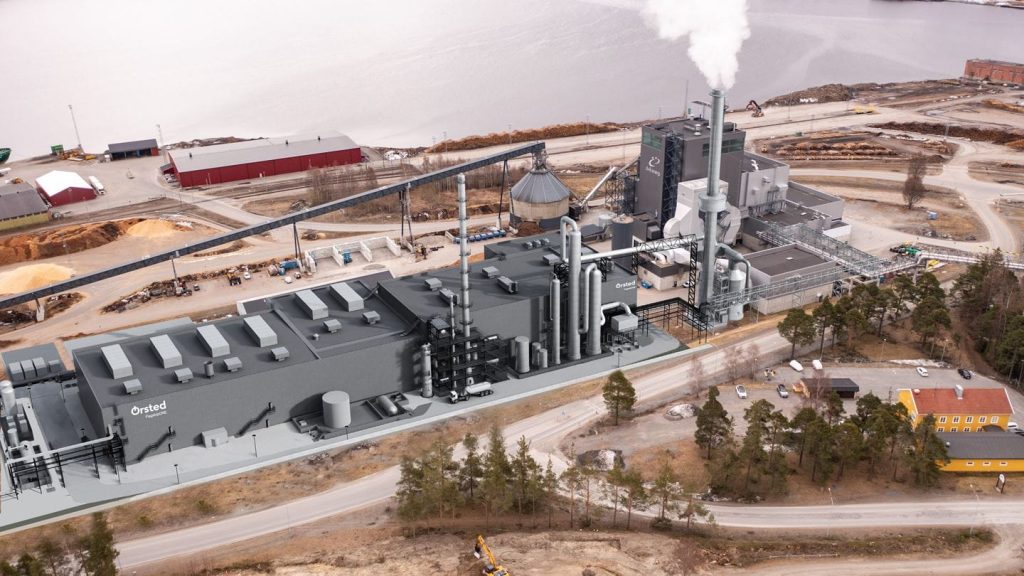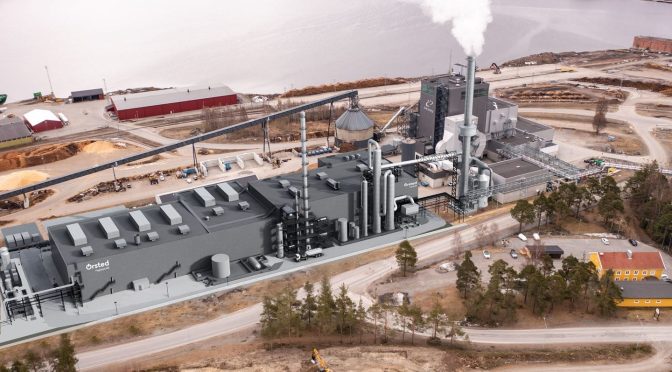Today, at COP28, Ørsted announced that the EU-Catalyst Partnership, which consists of the European Commission, Breakthrough Energy Catalyst, and the European Investment Bank, has vowed to support Ørsted’s FlagshipONE project, highlighting the innovative nature of this project and its potential to contribute to the decarbonisation of shipping. FlagshipONE is Europe’s largest e-methanol plant and is currently the world’s strongest proof point that carbon-neutral shipping is possible.
Breakthrough Energy Catalyst is a first-of-its-kind model, bringing together government partners and leading organisations from across the private sector to fund and scale emerging climate technologies. Breakthrough Energy Catalyst will acquire a 15 % equity interest in FlagshipONE and provide a grant to the project, subject to the fulfilment of funding conditions. With the funding supporting the project, Ørsted will seek to sign long-term offtake agreements, creating a new model for the shipping industry to purchase fuel, which will be needed for future projects to secure the capital required to scale production of green fuels.
In addition, the project is also expected to receive a grant from Horizon Europe and a quasi-equity investment from EIB through InvestEU. EU funding for the partnership is from Horizon Europe and the EU Innovation Fund within the framework of InvestEU according to the established governance procedures.The EU funding will contribute to the first commercial demonstration of the technology of FlagshipONE. Located in Örnsköldsvik in northern Sweden, FlagshipONE is expected to produce up to 55,000 tonnes of e-methanol each year to enable the shipping industry offtakers to achieve a >95 % reduction in carbon emissions versus when using conventional fossil fuels.
Werner Hoyer, President of the European Investment Bank, says: “Putting the world on track for net-zero will require game-changing technologies, especially for the hard-to-abate sectors in the economy. Today, we’re announcing our intention to support – under the EU-Catalyst Partnership – Ørsted’s FlagshipONE project to decarbonise the heavy shipping industry. Through our cooperation with the European Commission and Breakthrough Energy Catalyst, we seek to finance the development and scale-up of innovative solutions that are essential for transitioning to climate neutrality.”
Mads Nipper, Group President and CEO of Ørsted, says: “We’re extremely proud to partner with three of the most forward-thinking and ambitious leaders in the green transformation, highlighting that FlagshipONE is truly a breakthrough project. Ørsted’s history of scaling technologies from first-of-a-kind to widespread adoption – often with support from EIB – gives us confidence that, together with Breakthrough Energy Catalyst, the European Commission, and EIB, we can apply that hard-won experience to delivering the maturation of the European P2X industry.”
Rodi Guidero, Executive Director of Breakthrough Energy and Managing Partner of Breakthrough Energy Ventures, says: “Today’s announcement demonstrates the tangible impact of Breakthrough Energy Catalyst’s approach. This collaboration helps advance FlagshipONE – from finalising development, commencing construction, and, ultimately, achieving operations. Together, we’re providing a blueprint for accelerating first-of-a-kind solutions that will help Europe meet its decarbonisation goals.”
Global shipping accounts for around 3 % of global carbon emissions, and the sector is a focus area for Ørsted as the company expands its presence in green fuels across Northern Europe and the US. FlagshipONE is the first e-methanol project in Ørsted’s green fuels pipeline. The company is also developing a 300,000 tonnes/year e-methanol project in the US Gulf Coast area, which was recently awarded funding by the US Department of Energy as part of the US ‘Hydrogen Hubs’ initiative. There are 230 dual-fuel ships in operation or on order, 47 % of which were announced this year, highlighting the rising interest from shipping companies.

FlagshipONE is located on the grounds of the Swedish biomass-fired combined heat and power plant ‘Hörneborgsverket’ in Örnsköldsvik, operated by Övik Energi. The e-methanol from FlagshipONE will be produced using renewable energy, which is almost exclusively the electricity source in this part of Sweden, and biogenic carbon dioxide captured from Hörneborgsverket. In addition, FlagshipONE will use steam, process water, and cooling water from Hörneborgsverket, and excess heat from the e-methanol production process will be delivered back to Övik Energi and integrated into their district heating supply.
The Ørsted vision is a world that runs entirely on green energy. Ørsted develops, constructs, and operates offshore and onshore wind farms, solar farms, energy storage facilities, renewable hydrogen and green fuels facilities, and bioenergy plants. Ørsted is recognised on the CDP Climate Change A List as a global leader on climate action and was the first energy company in the world to have its science-based net-zero emissions target validated by the Science Based Targets initiative (SBTi). Headquartered in Denmark, Ørsted employs approx. 8,000 people. Ørsted’s shares are listed on Nasdaq Copenhagen (Orsted). In 2022, the group’s revenue was DKK 132.3 billion (EUR 17.8 billion).
The EU-Catalyst Partnership brings together the Commission, the European Investment Bank, and Breakthrough Energy Catalyst. It was first announced at the Mission Innovation Ministerial Conference in June 2021 by Commission President Ursula von der Leyen and Bill Gates, founder of Breakthrough Energy. The partnership will mobilise up to EUR 820 million between 2022-2026 to accelerate the deployment and rapidly commercialise innovative technologies that will help deliver on the European Green Deal ambitions and the EU’s 2030 climate targets. Each euro of public funds is expected to leverage three euros of private funds. Investments will be directed towards a portfolio of EU-based projects with high potential in five sectors: renewable hydrogen; sustainable aviation fuels; direct air capture; long-duration energy storage, and decarbonisation of industry.


